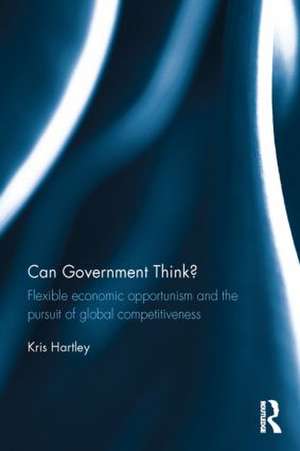Can Government Think?: Flexible economic opportunism and the pursuit of global competitiveness
Autor Kris Hartleyen Limba Engleză Hardback – 4 noi 2014
This book mines institutional economics, public administration, and research theory and practice for complementary elements that can inform an emerging governance paradigm based on flexible economic opportunism. Through an eclectic suite of cases from the developing and developed worlds including Asia and North America, this book reveals how patterns of institutional and administrative change impact the efficacy of public policy. Flexibility may be this century’s most critical dimension of global competitiveness, and systems configured to quickly and comprehensively capture economic opportunities will win the marketplace of development ideas. This book advances that discussion.
Preț: 1218.08 lei
Preț vechi: 1485.47 lei
-18% Nou
Puncte Express: 1827
Preț estimativ în valută:
233.08€ • 253.97$ • 196.40£
233.08€ • 253.97$ • 196.40£
Carte tipărită la comandă
Livrare economică 23 aprilie-07 mai
Preluare comenzi: 021 569.72.76
Specificații
ISBN-13: 9781138782754
ISBN-10: 1138782750
Pagini: 228
Ilustrații: 4
Dimensiuni: 156 x 234 x 18 mm
Greutate: 0.45 kg
Ediția:1
Editura: Taylor & Francis
Colecția Routledge
Locul publicării:Oxford, United Kingdom
ISBN-10: 1138782750
Pagini: 228
Ilustrații: 4
Dimensiuni: 156 x 234 x 18 mm
Greutate: 0.45 kg
Ediția:1
Editura: Taylor & Francis
Colecția Routledge
Locul publicării:Oxford, United Kingdom
Public țintă
Postgraduate and UndergraduateCuprins
Introduction Part I: Institutions 1. Understanding Institutions 2. Institutions in Research and Practice 3. Institutions and Economic Development 4. Institutions and Political Power 5. Institutions and Global Urbanization Part II: Public Administration 6. Contrasting Paradigms: Traditional Bureaucracy and Collaborative Governance 7. Emergent Paradigms: From Neoclassical to Postmodern 8. Administration in Local and National Development Part III: Evidence-Based Policy 9. Foundational Thinkers in Epistemology 10. Research Methods and Empirical Validity 11. Use of Evidence in Environmental Regulation 12. Nationalizing Benefits and Localizing Costs in Industrial Development 13. Evidence-Based Intervention for Housing Markets Conclusion
Descriere
@text: This book contributes to the dialogue among scholars, practitioners, and students about the efficacy of economic policy systems, methods for analyzing them, and innovative approaches to reforming them. This book also generates a new discussion about post-partisan governance focusing on adaptability and pragmatism.










